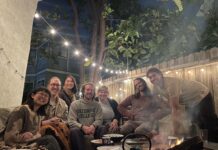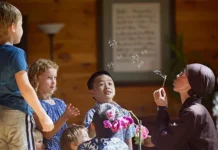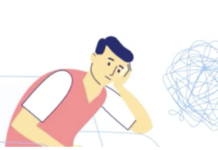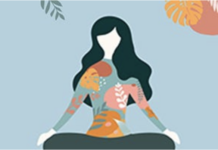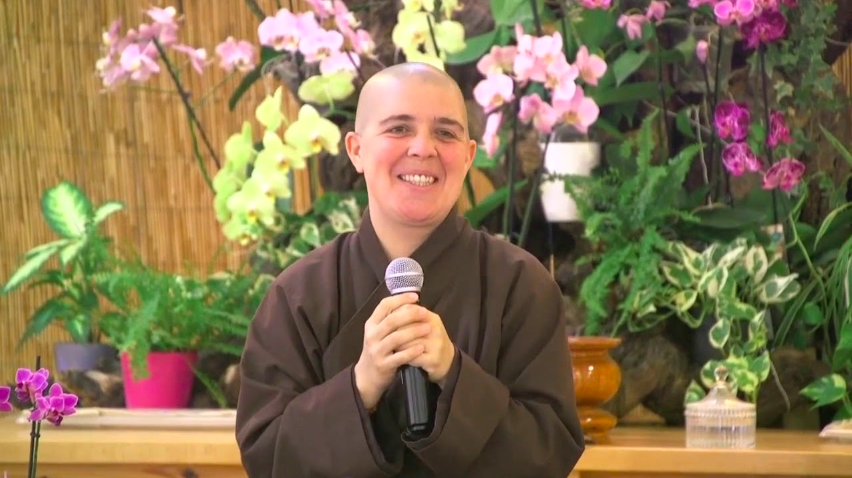
Q: How did you know that the monastic path is for you?
Sister Luc Nghiem (LN): I heard about Plum Village in a newspaper article. I read it, looked at my mom and told her half jokingly, “Maybe this is for me.”
The article was about the spirit of the Summer Retreat with children playing ping-pong. I remembered something written about the tomato, and we can see the sun and the rain in the tomato. Everyone enjoyed slowing down. Something deep inside of me longed for this, so I thought, “I need to go to this place.” I came two months later and never left. I fell in love with the Sangha, which was my first love, and then the Dharma. At the beginning, I didn’t understand why everybody was impressed by Thay. I was not looking for a teacher. After living in Plum Village for a few weeks, I understood how precious and wonderful our teacher is.
Q: As a monastic, you integrate environmentalism and sustainable living into your practice in Plum Village. What helps you to remember that we are one with the Earth and that interbeing is real?
LN: I feel lucky because before meeting Plum Village, I was totally in a state of ignorance. The interbeing nature of everything and caring for the body and mind was not my cup of tea, so I had to start from scratch. I was 27 years old, and maybe that’s why I valued the practice so much. I had to stick with the practice of walking mindfully, being aware of my steps and being aware of the earth. I had always lived in cities, so when I came to Plum Village—in the countryside—it was new for me to be in touch with nature. Until now, thanks to the mindfulness practice, the connection with the universe is very alive in me. I also recently had a chance to help launch the Happy Farm in the Lower Hamlet on a more organizational level rather than planting seeds.
Being in nature touches my heart because I didn’t grow up in that environment. I am in touch with people who are in the same state of ignorance as I was before Plum Village and who are not in touch with the insight and the reality that we are one with nature. I feel so grateful to know and to feel that I am one with everyone and that I am not separated from the earth, the sky, the spider, the little animal, the trees, rivers, and mountains. I feel I have a kind of duty now that I am on this spiritual journey. I have discovered things I didn’t know before because nobody told me or maybe it didn’t somehow enter my consciousness. I have changed for the better, so I want to bring some change without pushing or forcing things.
Q: How does your understanding of interbeing translate into your responsibility in the community as a shopper? What steps have you already taken to live more sustainably, and what challenges do you face?
LN: I have been the shopper in Lower Hamlet for two years, and my way of shopping today is different from two years ago. We have made big improvements; we almost grow all the vegetables, and we have organic grains and flour organic. It seems that two years was necessary for the community to get used to this way of life.
When we practice in the monastery,
we also practice for the world.
Now it seems that the community sees the organic food as something normal and that this is something we should continue doing, so that’s a good thing. Some challenges I have faced are whenever I have new ideas, like plastic for example. It’s really hard to find a product that causes zero harm to the environment; there’s always something causing harm, so it’s a little painful when I have to buy things in big quantity for our large community, while knowing that damage or harm is caused somewhere for someone or for the Earth. But things are better than before, so that’s something I keep in mind.
I talked to a sister recently and said that it would be wonderful for Plum Village to be a spiritual and sustainable, ecological community. She laughed at me and said, “You mean a perfect community?”
For those who have awareness of the ecological impact and situation in the near future—in a few years, 10 years, or who knows—we feel the urgency to really change things now and take big steps. I have been looking into this area while living in the Sangha. If you are living alone, as an individual, as a couple or a family, or even as a small community of a dozen, you can make the choice or radical change. If all the conditions are with you, you can make such a big change. But living in a Sangha, in a large community of few hundreds, requires another kind of sustainability like asking: What is my priority?
If I feel my priority is the Earth and I cannot live with so much plastic anymore —for example—or I cannot live knowing that some of our products are damaging the Earth, at some level, I cannot live in that Sangha because I will live with too much pain in my heart. That is why I have to keep the connection with the love, the joy, the peace and the spiritual quality our Sangha has as nourishment for me. One of the elements of love, from my point of view, is patience. In a community, this element of patience is something we have to keep alive in our mind and heart while keeping the direction we need to go. If I suddenly come one morning and say, “From now on, all the food will be local and seasonal! … No more tomato in the winter!” This will cause suffering in people’s heart, so it’s not going to bring us at the end. Maybe we will be an ecological, earthly friendly community but then all the joy, love, peace, brotherhood, and sisterhood that everybody feels when they come to Plum Village will disappear.
We’ve asked ourselves, “What would Thay tell us?”
It’s a little bit like a koan. I go back to my practice and be happy with whatever I can do as an individual in my community to continue watering this seed of change in me. And one day, the Sangha will be ready to change some aspect of our daily habits. Things are moving in the collective consciousness as we are not separated from the outside world. Many demonstrations are happening in Europe, US and Canada. I have trust and faith that the way is not by pushing, forcing or demanding too much from my community. We should be aware of the love, joy and peace and not be too strict on others. If we want to be “strict,” we could that for ourselves and change our own habits.
Q: You recently went with a group of monastics and lay friends for a climate change march in Bordeaux. Could you share your experience as a monastic demonstrating on the streets, the people’s reactions, and the Plum Village way of taking part in a demonstration?
LN: We decided to go at the last minute to join the climate change walk. This was a continuation of a session with many brothers, sisters and lay Sangha members concerning everything that has happened with the demonstrations in France over the past few months.
It was our initiative and aspiration to continue Thay’s teaching and spirit on Engaged Buddhism in climate change demonstrations. We know that when we practice in the monastery, we also practice for the world. This is something I have always felt deeply in my heart. Until now I never wanted to do things outside, because when I walk in peace, I am in touch with some part of the world that is in need of peace or love.
This is my contribution. I don’t think we should underestimate this practice. Recently, I am more in action. When I am in connection with all the lay Sanghas in France and around the world, I ask myself, “What am I doing? What are the Plum Village friends doing? Are they going in the streets for demonstrations? Are they participating in some debate? By asking these questions, I was aware that we, as Plum Village, haven’t had a voice yet to encourage people to do things and act with love and peace.
We have to embody the practice of loving kindness, understanding and deep listening
while being present for the world.
Thay always invited us in the past whenever something happened and often had mentioned something in his Dharma talks to invite the Sangha to engage with the world and in the world. Now that he cannot do that anymore, we’ve asked ourselves, “What would Thay tell us?” So we decided to join the climate change march in Bordeaux. Actually, that was my first demonstration. At the end of the march, people came to us and asked about us.
Some of these people told us, “Thank you, you brought a lot of joy.” We were with some lay friends who were playing music and drum, so we had sort of a small orchestra. As we all know, we love singing and music at Plum Village, so we brought its spirit into the walk and the streets. This felt harmonious with the people, and we were well received.
I often say that if we want to change something in our life, we can do it with strength and courage. This is the spirit of Engaged Buddhism. We have to embody the practice of loving kindness, understanding and deep listening while being present for the world. We are not only focusing on what we need to change. We need to keep our energy light and joyful because this is a serious and urgent matter. We have to have a balance, otherwise we will lose our energy. We need to know how to keep our energy balanced between being activists and being in touch with a source of love, joy, lightness and harmony within our own body and cells, and between our human body and the universe, with the earth, nature and life.
Keeping this connection in our awareness helps us have a balance in our activism. For that, we need to be aware of our own states of mind, our own state of how we feel in our body. Are we relaxed, tense, stress or anxious? This is where the mindfulness energy is coming. Having a practice that can help us generate mindfulness whenever we want, wherever we are and with whatever we are doing can help us to realise: “I’m going too far. I need to bring myself back into a middle way.” Then with no rush to make huge steps, we reinforce patience and trust. One day out of this middle way, a tremendous change will manifest when all causes and conditions are sufficient.
Interview conducted by Annica in Lower Hamlet on 15th February 2019 and transcribed by Martina McNaboe

